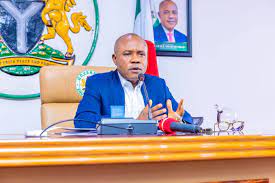To reduce the burden of Obstetric fistula in Nigeria, the U.S Agency for International Development (USAID) has launched a $10 million project tagged “MOMENTUM Safe Surgery in Family Planning and Obstetrics Project”, aimed at preventing, managing and alleviating the suffering of women living with obstetric fistula and its complications in Nigeria.
This is as the international organisation revealed that Nigeria has the highest burden of fistula globally, accounting for 40 percent of cases worldwide, with an estimated 12,000 new cases arising annually.
Speaking during the launch in Abuja, the U.S Ambassador to Nigeria, Mary Beth Leonard, stated that, while the condition is surgically treatable, more than 150,000 Nigerian women languish on waiting lists for the procedure, “including girls of childbearing age”
She said: “They are often unable to live a dignified, rewarding life due to this debilitating and stigmatizing health condition. The United States has been pivotal in partnering with the Government of Nigeria in improving primary health care.
“This new $10 million activity builds on the gains of the previous USAID funded fistula interventions in Nigeria, which conducted over 18,400 fistula surgical repairs and about 800 non-surgical repairs in 14 fistula centers in 13 states.
“USAID also supports communities, states, and federal institutions to prevent and respond to the drivers and root causes of obstetric fistula – namely early and forced marriages, and other forms of gender-based violence.
“We are confident that our assistance will help Nigeria’s health care providers, professional bodies, and communities to identify, manage, and prevent obstetric fistula, female genital mutilation, and other forms of gender-based violence in a complimentary manner.
“To that end, the Momentum activity will work closely with the Ministry of Women’s Affairs to link mothers who have undergone fistula repair to Ministry-led rehabilitative, empowerment and reintegration services in their respective communities. Fistula is both preventable and treatable, and by working in partnership with the Government of Nigeria, we can do both.”
Also speaking, the Regional Representative of USAID implementing partner, Engenderhealth, Nene Cisse, stated that the organisation has worked with inspiring community-based and women’s organizations to expand knowledge about fistula prevention and to connect women with fistula to knowledge and care.
“Our research with the Population Council in Nigeria showed us that many of the barriers to fistula information, screening, diagnosis and treatment reflect gender inequality – women’s greater lack of literacy, vulnerability to stigma, and challenges in getting permission simply to seek or travel to care.
“We know the new MOMENTUM Surgery in Family Planning and Obstetrics Project will also join with partners from the national to the community level, to build on the Nigeria’s tremendous leadership in establishing fistula services across the country, and to support the expansion of women’s access to safe surgical care,” she said.
On her part, the Director of MOMENTUM,Vandana Tripathi, disclosed that through Engenderhealth’s Fistula Care and Fistula Care projects, USAID has supported over 18,400 fistula repairs across 13 states in Nigeria, trained over 50 fistula surgeons and over 2,700 other healthcare workers in fistula prevention and treatment.
According to Tripathi, these projects have also supported the provision of nearly 1.2 million family planning counseling sessions and delivery of over 685,000 couple-years of protection against unintended pregnancy.
“In these projects, strong partnerships with the Federal Ministry of Health, the Federal Ministry of Women and Social Development, and their state level counterparts facilitated our contributions to national policy and guidance on fistula prevention and treatment.
“However, there is much to do. We know that inequities in access to health information, screening, referral, and care make it hard to prevent and treat fistula. Gaps in access to quality midwife-led care make it harder to prevent and treat fistula early through catheterization after obstructed labor.
“In Nigeria, MOMENTUM Safe Surgery in Family Planning and Obstetrics will support the Government of Nigeria to sustainably build awareness of, equitable access to, and provision of high quality, voluntary, indicated and consented safe surgery in Bauchi, Kebbi, Sokoto, and Ebonyi states and FCT,” she stated.
Similarly, the Minister of Women Affairs, Pauline Tallen, stated that the overall Fistula situation in the country is unacceptable, even as she advised that all hands must be on deck to support the government’s efforts at the elimination of Fistula in the country.
Other dignitaries present at the launch includes, the First Lady of Kebbi state, Dr Zainab Shinkarfi Bagudu, the commissioners of health from Sokoto, Bauchi, Ebonyi and Kebbi states, as well as actress and fistula advocate, Stephanie Linus.




